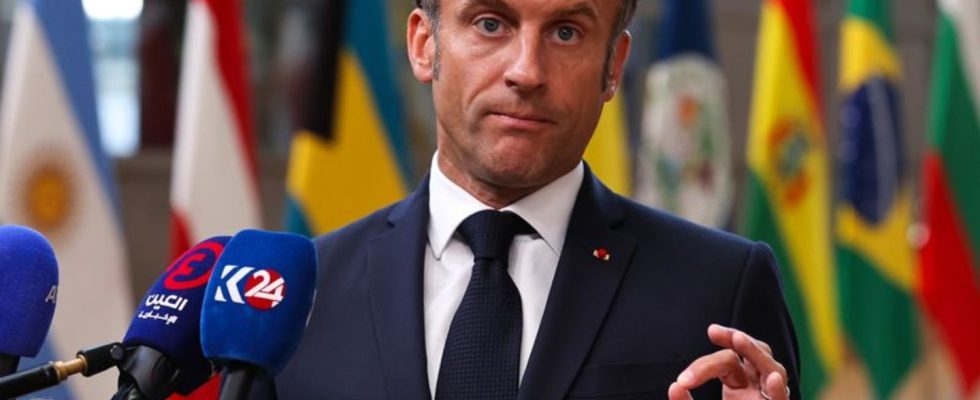After coup
Weeks of hesitation: France withdraws troops from Niger
French President Emmanuel Macron wants to withdraw French armed forces from Niger. photo
© Francois Walschaerts/AP/dpa
Mali, Burkina Faso, Niger: France’s soldiers are once again leaving a Sahel state after coup plotters broke off cooperation. The withdrawal will have consequences – perhaps also for the Bundeswehr.
Two months after the military coup in Niger, the former colonial power France is forced to withdraw its troops from the West African country. This means their influence in the region continues to dwindle. Around 1,500 French soldiers are expected to return home from the country by the end of the year French President Emmanuel Macron announced last night. The Bundeswehr also has soldiers in Niger. It is still unclear what the withdrawal of French troops will mean for them.
“We are now waiting to see further developments,” said Defense Minister Boris Pistorius (SPD) today. The air transport base in Niamey with its 100 German soldiers is important for the withdrawal from neighboring Mali, he said. “We’re watching. We’re staying on the ball. We’re keeping an eye on safety. We don’t see any need for action right now, today.” The US government is still pending a decision on how it will react to its troops stationed in Niger.
Last ally in the region
At the end of July, the military in Niger led by the new ruler General Abdourahamane Tiani deposed President Mohamed Bazoum. The former colonial power France, the EU, the USA, the African Union and neighboring states, among others, are calling for a return to constitutional order. The country of around 26 million people was the last democratic ally of the USA, France and other European countries in the fight against terrorism in the region, where jihadists are spreading. The country’s large uranium deposits also played an important role for France. A central migration route also runs through Niger via Libya to Europe.
Withdrawal may have been France’s only way out of the impasse caused by the coup in Niger. Military cooperation came to a standstill, the putschists then unilaterally terminated it and also demanded the withdrawal of the French ambassador. Although France never tired of declaring that Bazoum was still the legitimate ruler and that it did not recognize the putschists’ demands, it still found itself in a deadlock. “We are not there to be hostages to the coup plotters in a way,” Macron said.
Years of spiral of violence
The situation is not new for the French. They had already been forced out of the countries following military coups in neighboring Mali and Burkina Faso. The withdrawal from Niger means a further loss of influence for France – even though the former colonial power tried to respond more closely to local needs in Niger after the bitter experience in Mali.
In fact, the security situation in Niger was the only one of the three countries to have improved somewhat recently. In Mali, on the other hand, Islamist terror has only gotten worse since the deployment of Russian mercenaries. But a spiral of violence that has lasted for years has caused great distrust among the population of the states. The economic dependence on the former colonial power also causes frustration. Added to this is propaganda from Moscow, which reinforces anti-French sentiment out of self-interest. Russian flags can also be seen at demonstrations in the Nigerien capital Niamey against the French presence.
“Neo-colonialist forces no longer welcome”
“It is positive that Macron understood that the withdrawal of French troops was inevitable,” said Ulf Laessing, regional office manager of the Konrad Adenauer Foundation for the Sahel. “The putschists had drawn their legitimacy from a campaign against the French troops and the ambassador from Paris. That no longer applies.” The junta in Niamey hailed the announcement as a “new step towards Niger’s sovereignty.” “Imperialist and neo-colonialist forces are no longer welcome on our national territory,” it said yesterday.
At the same time, the fight against the Islamist terrorist groups in the region is likely to become more difficult, said Laessing. “The Germans and other EU countries only helped with equipment and training. Despite all the criticism of France, it must be said that only Paris was willing to actively fight.” The EU began a new military partnership mission in Niger at the beginning of the year. The Bundeswehr was previously involved in training Nigerien special forces. It also operates an air transport base in Niamey, which is the hub for the withdrawal of more than 850 soldiers after the end of the UN peacekeeping mission in neighboring Mali.
Important partner of France in Chad
There is now speculation as to whether some of the French soldiers from Niger could be relocated to neighboring Chad. The French General Staff said that no details about the withdrawal could be given at the moment. So far, around 1,000 French soldiers are stationed in Chad. Chad is also led by a military government that has postponed elections and bloodily suppressed protests. A large part of the population also does not speak well of France. Interim President General Mahamat Idriss Déby Itno is – like his father before him – an important partner for France.
In West Africa, France will continue to have troops in Senegal and Ivory Coast. There are also French soldiers in Gabon in Central Africa – where a military coup overthrew the ruling family that had ruled for decades in August – and in Djibouti in East Africa. In total, there are around 3,000 personnel in the four countries who can support operations if necessary. Paris also takes part in international missions.

